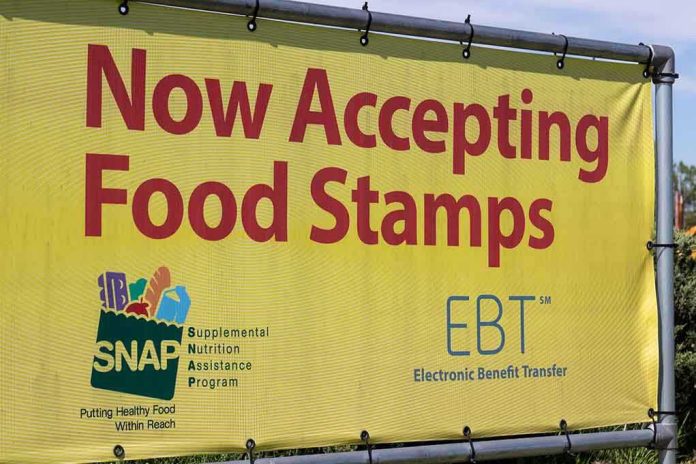
The fate of 850,000 Virginians’ next meal now hangs in the balance, as a political standoff in Washington has triggered an unprecedented state of emergency—and left both families and leaders scrambling for answers.
Story Snapshot
- Governor Youngkin has declared a state of emergency to address the looming cutoff of SNAP benefits to more than 850,000 Virginians.
- The crisis is directly blamed on Congressional Democrats’ refusal to pass a federal budget resolution.
- Food banks warn they cannot fill the gap if SNAP funding lapses, raising fears of a hunger crisis.
- The scale and political framing of this emergency is unprecedented in Virginia’s history.
State of Emergency: SNAP Benefits on the Brink
Governor Glenn Youngkin’s emergency declaration on October 23, 2025, was not just another political maneuver—it was a direct response to a federal government shutdown with the power to upend daily life for over 850,000 Virginians. SNAP, the federal safety net program formerly known as food stamps, stands on the verge of collapse in the state if Congress does not act by November 1. Youngkin, assigning blame squarely to Congressional Democrats, has positioned Virginia as both first responder and last line of defense for its most vulnerable citizens.
For many, this is not just about paperwork and posturing. The prospect of lost SNAP benefits means immediate risk of hunger for families, children, the elderly, and the disabled—people who rely on this federal aid for basic sustenance. The governor’s office claims it will use emergency powers to provide stopgap food assistance if federal dollars do not arrive, but operational details remain uncertain. The move is a high-profile reminder of how political gridlock in Washington can have swift, real-world consequences far from the marble halls of Congress.
Federal Gridlock, State Action: How Did We Get Here?
This crisis began with partisan deadlock in Congress over federal appropriations. A failure to pass a continuing resolution caused the government to shut down in early October. As weeks dragged on, the clock began ticking for programs funded month-to-month—including SNAP. Youngkin’s action is historic: while funding interruptions have threatened SNAP before, no Virginia governor has ever declared a state of emergency solely because of a lapse in federal food assistance funding. The Federation of Virginia Food Banks warns that, for every meal they distribute, SNAP provides nine; they cannot possibly make up the difference if the program stalls. The scale of the problem—over 854,000 recipients, with 172,000 in Central Virginia alone—underscores why state and local officials are sounding the alarm.
Food banks, local governments, and social service agencies are bracing for impact. Fairfax County officials, for example, have acknowledged they are awaiting specific guidance from the Virginia Department of Social Services about how emergency measures will be implemented. Meanwhile, SNAP recipients have already received their October benefits, but November’s assistance is at risk if the shutdown persists. The specter of empty pantries and overrun food banks looms large.
Political Firestorm: Assigning Blame, Seeking Solutions
Youngkin’s state of emergency announcement contains a pointed political message: he accuses Congressional Democrats of using hungry Virginians as “leverage” and singles out Senators Mark Warner and Tim Kaine to break the deadlock. At the same time, he directs praise toward former President Trump’s administration for offering support, though details about that support are sparse. The blame game has intensified the partisan divide and thrust the issue of federal safety net reliability into the spotlight. For SNAP recipients, the politics matter less than the outcome: they need certainty, not soundbites, about how they will feed their families next month.
Food banks and local charities face their own reckoning. Eddie Oliver of the Federation of Virginia Food Banks puts it bluntly: “There is simply no way that we can make up significant gaps or losses to that program.” The magnitude of SNAP’s role cannot be overstated—without it, Virginia’s charitable food sector is staring down a tidal wave it is powerless to stop. As politicians argue, the on-the-ground reality grows more urgent by the day.
Long-Term Consequences: Trust in Safety Nets and Leaders at Stake
If SNAP benefits are interrupted, the pain will not be contained to kitchen tables alone. Economic ripples will hit grocery stores and local businesses that rely on SNAP spending. Social services will be stretched thin as more families turn to food banks, which already admit they cannot meet this scale of need. The long-term damage could be profound: once trust in government safety nets is lost, it can take years to rebuild. Political leaders on both sides of the aisle now face the test of whether they can restore confidence—or whether this emergency will leave lasting scars on Virginia’s most vulnerable citizens.
As November approaches and federal dollars remain frozen, the question is no longer whether the SNAP crisis will shape Virginia’s political landscape—but how deep its impact will be felt, and how long its consequences will linger.
Sources:
Governor of Virginia Official Press Release
Fairfax County Government Update

